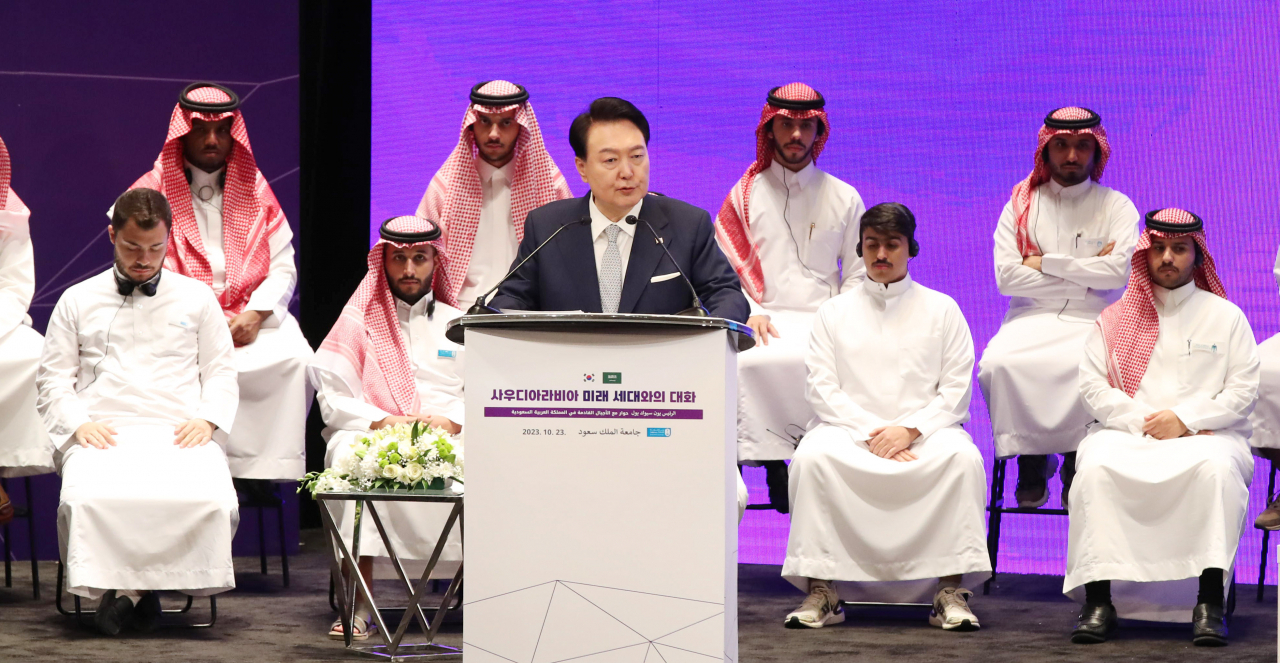 |
President Yoon Suk Yeol, who is on a state visit to Saudi Arabia, gives a lecture at the Dialogue With Saudi Arabia Future Generations forum held at King Saud University in Riyadh, Saudi Arabia, Monday. (Yonhap) |
RIYADH, Saudi Arabia -- President Yoon Suk Yeol said South Korea and Saudi Arabia could contribute to sustainable global growth by forging a future-oriented partnership that encompasses the fields of energy, digital technology, biology and space, underscoring a history of cooperation between the two countries.
On his third day of a state visit to Saudi Arabia, Yoon stressed the importance of the special partnership between the two countries that began in the 1970s, serving as the foundation for South Korea’s economic growth known as the “Miracle on the Han River.”
“The special partnership between Korea and Saudi Arabia, formed through infrastructure cooperation such as highway construction in the 1970s, has become an important foundation for Korea's economic development,” Yoon said at a forum held at King Saud University in Saudi capital Riyadh. Citing Saudi Arabia’s “Vision 2030” and the Neom City project as examples of the country’s preparation for the post-oil era, Yoon expressed his “respect” for the vision of Saudi Arabia.
“Korea and Saudi Arabia must emerge as first movers, pioneering and leading new fields,” Yoon said.
Following his speech, Yoon attended the Korea-Saudi Arabia Future Technology Partnership Forum at the King Abdulaziz City for Science and Technology, where he met with technology pioneers from both nations.
The forum aimed to explore research and development, as well as industrial solidarity and cooperation in four areas between the two countries: energy, digital, bio fields and space. Organized to discuss ways to expand future cooperation in science and technology, the event also covered topics related to construction and resource cooperation, according to the presidential office.
At the forum, Yoon said when South Korea, with its world-class technology in the four areas, cooperates with Saudi Arabia, the two nations can together achieve Saudi Arabia’s ambitious goals and contribute to sustainable global growth. He expressed his expectation that the forum would be a cornerstone in developing a future-oriented partnership between the two countries.
“Saudi Arabia is pursuing extensive reforms across its economic and social systems based on digital technologies, and collaboration with leading South Korean companies is already becoming visible,” said Yoon's economic secretary, Choi Sang-mok.
Choi noted that advanced city projects such as Neom City serve as both an excellent test bed and a market for implementing South Korea’s outstanding digital technologies.
The Yoon administration said he believes that the numerous abandoned oil and gas fields in Saudi Arabia will provide the perfect environment for demonstrating Korea’s carbon capture and storage technologies.
Yoon also attended the Korea-Saudi Arabia Construction Cooperation 50th Anniversary Ceremony at the Riyadh Neom Exhibition Hall with the participation of around 200 officials from infrastructure companies of both countries.
The event commemorates 50 years since Samwhan Corp. first entered the Saudi Arabian market with the Al Ula-Khaybar expressway in 1973. It aimed to present a future vision of expanding bilateral cooperation into advanced future cities and digital infrastructure fields, including Neom City.
At the event with Yoon in attendance, contracts were signed for various projects, including Jafurah Phase 2, an unconventional gas development located onshore in Saudi Arabia and operated by Saudi Arabian Oil.
Jafurah Phase 2 is a project where Hyundai Engineering and Hyundai E&C will build a natural gas refining plant in the Jafurah region, which houses the largest shale gas reserves in the Middle East and is owned by Aramco.
“Today, Hyundai Engineering and Hyundai E&C signed a contract with Saudi Aramco for the Jafurah Phase 2 project valued at $2.4 billion,” Choi said. “This achievement once again proves the stature of Korean companies in the plant market, even amid intense competition from countries including China.”
Earlier in the day, Yoon's office also said the two countries were “in the final stages” for large-scale defense collaboration across various fields, such as air defense, firepower and weapons.
Kim Tae-hyo, first deputy director of South Korea's National Security Office, told reporters that the government was discussing “a long-term, systematic defense cooperation program" rather than one-time cooperation. Yoon’s office, however, declined to comment on details of the weapon system and the amount of the contract being discussed, citing the sensitivity of the matter. "All I can say is that it is at the completion stage, and the scale and amount are quite large," said an official on condition of anonymity.
Saudi Arabia, which has faced attacks from Yemen's Houthi rebels using ballistic missiles and drones, has significant demand for interceptor missiles. Crown Prince Mohammed bin Salman reportedly expressed interest in the KM-SAM (Cheongung) system during his visit to South Korea in November last year.
Taking the opportunity of Yoon’s state visit, South Korea and Saudi Arabia have decided to announce a joint statement containing the status and direction of cooperation covering economic, political and international issues. It is reported that the joint statement will address security issues on the Israel-Palestine conflict, the Ukraine war and North Korea’s nuclear and missile threats.





![[Exclusive] Hyundai Mobis eyes closer ties with BYD](http://res.heraldm.com/phpwas/restmb_idxmake.php?idx=644&simg=/content/image/2024/11/25/20241125050044_0.jpg)
![[Herald Interview] 'Trump will use tariffs as first line of defense for American manufacturing'](http://res.heraldm.com/phpwas/restmb_idxmake.php?idx=644&simg=/content/image/2024/11/26/20241126050017_0.jpg)
![[Herald Review] 'Gangnam B-Side' combines social realism with masterful suspense, performance](http://res.heraldm.com/phpwas/restmb_idxmake.php?idx=644&simg=/content/image/2024/11/25/20241125050072_0.jpg)